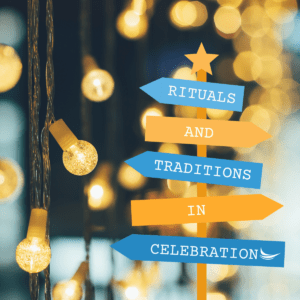 December is a month of celebration. It is also a month full of rituals and traditions.
December is a month of celebration. It is also a month full of rituals and traditions.
Rituals differ from traditions in that rituals involve a series of actions that are repeated. A tradition is similar in that beliefs or behaviors are passed down, with cultural significance tied to the past; however, they do not need to be performed in a prescribed order.
A common tradition is decorating for the holidays. Homes are being decorated; some items are visible for all to see and other elements may be more private. Special items, such as candles may have symbolic meaning rooted within cultural or religious traditions and be incorporated into rituals. Jewish friends may have a menorah with candles during Hanukkah while Christian friends may have an Advent Wreath with advent candles. In both traditions, the lighting of candles taking place in a prescribed order. Another example of a ritual that has become a popular tradition with candles involves lighting and blowing out candles on birthday cakes.
Both rituals and traditions have an important place in families and society. They are an important part of identity, celebrate the unique cultural heritages within families, and build community.
Traditions may involve items that are fun and purely whimsical, changing through the seasons. You may find yourself surrounded by favorite colors, scents, and textures. Who do you know who gets excited to take out their seasonal items? Ugly sweaters or matching pajamas anyone? You may switch out decor, use scented candles/ lotions, buy flavored beverages, and make food or baked goods based on the season. Goodbye Pumpkin Latte and hello Peppermint Mocha! Celebrations based in traditions such as sharing food/ sweet treats, exchanging gifts, and special [virtual or outdoor] events are taking place. There is so much great expression in celebration, not only in the United States but also worldwide. Traditions can be acquired over time, and passed on through the generations within celebrations.
Did you know that while rituals are an important component in celebrations, they can also cause clinically significant distress? There is actually a special category of obsessive thoughts, a form of Obsessive Compulsive Disorder (OCD) that involves religious or moral obsessions known as Scrupulosity. In OCD, individuals experience intrusive recurring, unwanted thoughts that cause distress. The thoughts or distressing sensations compel one to engage in repetitive behavior, known as compulsions to help alleviate the distress. With Scrupulosity OCD, there are obsessive concerns that something that one is thinking or did is a major violation of religious or moral doctrine. There may be specific fears directly tied to one’s religious faith (e.g. committing a sin or other religious violation); however, one does not need to align with religious beliefs to struggle in this area since Scrupulosity also covers moral doctrine (e.g. being a “good” person, worries of telling a lie).
A helpful guide if there are concerns of rituals that may be OCD-related is to compare rituals to the norm of the culture. If a standard practice is to recite, chant, or pray x number of times per day, but you find yourself consumed with distress, repetitively engaging in behavioral or mental rituals beyond cultural norms until a certain state of certainty is achieved, this would likely be considered outside the norm. Also, if there is fear that if you do not engage in the ritual, you will violate norms or you excessively seek reassurance to relieve anxiety distress around concern of breaking religious doctrine of moral code, you may have OCD. The great news is that there are evidence-based treatments, with Exposure and Response (Ritual) Prevention for Obsessive-Compulsive Disorder recommended as a treatment approach.
To learn more about OCD and treatment approaches or to find a clinician who works with OCD, here are some resources to get started:
https://iocdf.org/about-ocd/ocd-treatment/erp/
https://rogersbh.org/resources/exposure-and-response-prevention-erp-how-does-it-work
https://care-clinics.com/new-client-experience/clinicians/
Written by: Charlotte Johnson, MA, LPCC
We’re Here to help
Our wellness experts will be happy to take care of you. You can CLICK HERE to schedule an appointment now or call (612)223-8898.
Meet Clinicians
We’re united by our commitment to providing effective, relevant, and innovative mental health support at all stages of your journey. Click Here to find out more about who we are, where we come from, and how we live out CARE’s mission every day.
The professionals at CARE are actively collecting and creating resources to help with what you need. We’re Here for You.



